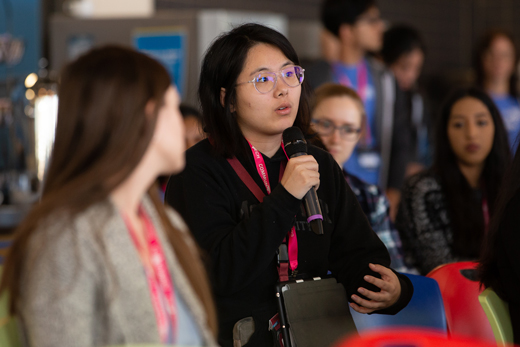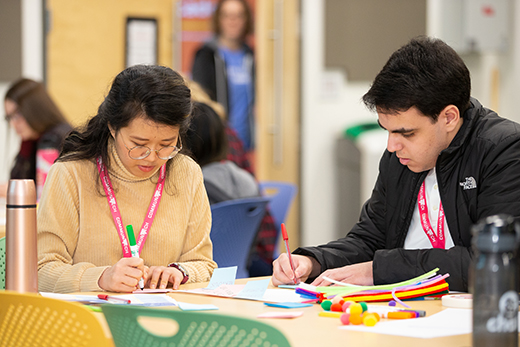Lean on your network to find mentors.
Take setbacks and turn them into opportunities.
Leave your ego at the door.
These are just three pieces of advice that helped kick-start the first Navigate Design: Craft Your Future conference at Communitech on Saturday, March 7.
Some 100 students in design programs, or who are considering a pivot into design programs, attended many of the 11 sessions sponsored by Google and the governments of Ontario and Canada. Presenters from such area firms as Google Stadia, SnapPea Design, Magnet Forensics, MappedIn and Shopify led them through workshops and took their questions about work in tech design.
After several years branded as Design To Win and partnered with the Code to Win national programming challenge, the gathering of post-secondary students debuted with a new name and a new two-pronged focus. That focus is to both show design students that there are many career opportunities in tech design, and that many of those opportunities are here in the Waterloo tech ecosystem, says Tina Wilton, Communitech’s Talent Program Manager.
“We want them to consider staying here in Waterloo, rather than going to other communities,” says Wilton. She said that the invitation list, which featured primarily Ontario students, was as inclusive as possible, with students in English, science and psychology joining students from design and computer science.
Candice Faul, a design thinking practitioner and part-time instructor at Conestoga College’s School of Creative Industries, says the focus for design is “How do we connect with human beings?” Whatever is being connected, whether that is a product or a service, “there is a human need that has to be served.” Faul said the event was to focus on “How do I get into design and how do I establish myself . . . what resources do I tap into to realize this as a career?”
She moderated the opening panel, where Jennifer Pretti of Google Stadia, Matt Neil of Faire, Sarah Church of Waterloo EDC and Victoria Vandenberg of SnapPea Design took questions and talked about their varied career trajectories. And varied those trajectories were: from first becoming interested in UX (user experience) in high school, to traditional student trajectories in business, science and rhetorical writing, all who pivoted to design.
Their backgrounds were different but their advice was similar:
- Find mentors who can help you find a workplace or develop within a workplace;
- Have a diverse portfolio and put your best work in it;
- Develop the “soft skills” that will help you ask better questions of users to help solve their problems; and
- Don’t solve easy problems: having constraints makes a project more interesting.

The focus of Navigate Design was
to let students know about career
opportunities in design,
particularly in Waterloo Region.
(Photo: Wayne Simpson for Communitech)
The students rotated through concurrent workshops, on everything from how to write a resume (Don’t cram two pages of information into a “one-page” resume), to brainstorming to spur creativity (Strive for big ideas and don’t exclude the impossible), to maximizing your creative talent (Get off the bus one stop before your regular stop and see what you discover).
Pretti, senior designer for Google Stadia, said Google was an event sponsor because UX is an integral part of any engineering team. Robert Barlow-Busch, UX design lead for the company, said Google’s mantra is “Focus on the user and all else will follow.” He said the UX community in the Waterloo tech ecosystem is “growing superfast, but has some catching up to do.”
Vandenburg, on the welcoming panel and a workshop presenter on designing impactful products, was a prize-winner of the 2019 Design to Win. Since then, she joined one company and founded another, while pursuing a master’s degree at OCAD. Her advice to would-be designers: “Every great product starts with an argument. Now, I am seeing that as a virtue. It taught me the importance of voicing yourself.”
Philippe Jean, the senior product designer at Shopify Plus who ran a workshop on unleashing creativity, said he hopes the students at the sessions: “. . . see the excitement and great opportunities in Kitchener-Waterloo.”
Filip Jadczak, who won the top Design to Win prize in 2017, and is now a UX designer with Magnet Forensics, presented on crafting job applications. He liked the new format, saying, “Students can see people at this event who are working in their field, and that there are cool opportunities in the region.”

Design included workshops led
by professionals from area tech firms.
(Photo: Wayne Simpson for Communitech
Celine Lee, a computer science student at the University of Waterloo, liked the hands-on experiences in the workshops.
Selina Hsu, in the mechatronics program at UW, thought it was “good exposure for someone like me who isn’t in design.”
Eric Oosenbrug, a psychology student at York University, was looking for more practical details about the day-to-day of working in design, but understood that non-disclosure agreements might limit what some of the presenters could say.
Forough Etemadifar, an Iranian student taking interactive design as a post-graduate course at Conestoga College, found the workshops “very useful. I regret that I couldn’t go to all of them.”
As Wilton told the crowd, “if you have a passion for design, please consider a career here.”

